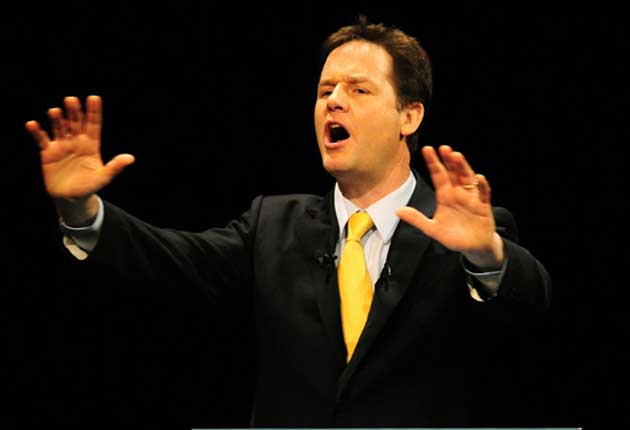Clegg could support Tories in a minority government
'Profound' policy differences would prevent formal coalition, says liberal think-tank

Your support helps us to tell the story
From reproductive rights to climate change to Big Tech, The Independent is on the ground when the story is developing. Whether it's investigating the financials of Elon Musk's pro-Trump PAC or producing our latest documentary, 'The A Word', which shines a light on the American women fighting for reproductive rights, we know how important it is to parse out the facts from the messaging.
At such a critical moment in US history, we need reporters on the ground. Your donation allows us to keep sending journalists to speak to both sides of the story.
The Independent is trusted by Americans across the entire political spectrum. And unlike many other quality news outlets, we choose not to lock Americans out of our reporting and analysis with paywalls. We believe quality journalism should be available to everyone, paid for by those who can afford it.
Your support makes all the difference.The Liberal Democrats would support a minority Conservative government in a hung parliament despite "profound differences" between the two parties, according to a report published today.
CentreForum, a liberal think-tank, predicted that divisions over policy would prevent Nick Clegg entering a formal coalition with Liberal Democrats sitting in a David Cameron Cabinet. But it concluded that the pressure on the third party to act responsibly in a hung parliament would result in Mr Clegg sustaining the Tories in power if they won the most seats – the general election outcome suggested by most recent opinion polls.
Julian Astle, the group's director who studied the detailed policies of the two opposition parties, found that they agree in only three areas – education, civil liberties and devolving power (or localism). But he said they are "poles apart" on issues such as tax, the environment, criminal justice policy, Europe and constitutional and political change, including voting reform for Westminster elections.
His report, "A Lib-Con trick", said the Liberal Democrats were sceptical about Mr Cameron's rebranding of his party and his claim to be a "liberal Conservative". It cited Tory plans to cut inheritance tax, the party's "ardent Euroscepticism" and its failure to turn its "green rhetoric" into hard policy.
On tax, Mr Astle said the Tories would take from the "super rich" to give to the "rich" while the Liberal Democrats would redistribute more widely, using wealth and pollution taxes to reduce the tax burden for those on low and middle incomes.
The report said: "It is impossible to imagine David Cameron choosing anyone other than George Osborne to be his Chancellor; Osborne and Cameron are friends and co-architects of the Conservative modernisation project. But it is no easier to imagine Vince Cable serving in a coalition government while Osborne makes economic policy; Cable believes Osborne to have been wrong on most of the big economic judgement calls since the current crisis began."
It added: "The parties have coalesced around an agenda of decentralisation, competition and choice in education and health. Their shared desire to put service users at the heart of public services reform could provide a foundation for future collaboration. This emerging consensus remains fragile, however, and could be undermined by the different choices the parties have made on funding: the Conservatives are prioritising the NHS; the Lib Dems are favouring schools."
Mr Astle said the Liberal Democrats had concluded that Mr Cameron's decision to emphasise green issues in his early days as leader had more to do with rebranding his party than saving the planet. "With many Tory members and supporters now openly questioning the veracity of the climate change science, many Lib Dems suspect that, in presenting his party as 'the new environmental party in Britain', the Tory leader is 'spinning' like the windmill on his Notting Hill home," Mr Astle wrote.
Despite the differences, Mr Astle concluded that the Liberal Democrats would decide to provide stability in the event of a hung parliament – not least to reassure the financial markets. He said their backing would broaden support for the action to cut the public deficit and "selling" a Tory government's "austerity measures" to voters suspicious of the Tories' motives.
The Liberal Democrats would be reluctant to frustrate the verdict of the voters by not supporting the Conservatives if they emerged as the largest party, he added. Mr Astle judged that all this would make a "Lib-Con" agreement possible, with Mr Clegg's party supporting a minority Conservative government in key Commons votes.
It is a prospect that the Tories are keen to avoid as they seek to win an overall majority. Yesterday Kenneth Clarke, the shadow Business Secretary, warned that a hung parliament would be a disaster. He told the London Evening Standard: "The electorate will bring upon themselves the consequences of financial panic if they produce a hung parliament or Labour minority government. It would be catastrophic."
Join our commenting forum
Join thought-provoking conversations, follow other Independent readers and see their replies
0Comments